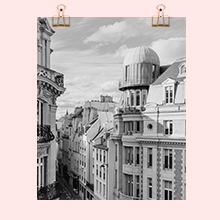Blog
美国亚马逊折扣 $15.00 奉承的 二十世纪的巴黎:失落的小说 美国亚马逊Amazon
Write an sale copywriter in Chinese using the AIDA (Attention, Interest, Desire, Action) formula about 二十世纪的巴黎:失落的小说
,don’t include word “title,Attention,Interest,Desire,Action”,

Price: [price_with_discount]
(as of [price_update_date] – Details)
1863 年,《海底两万里》和《地心游记》的著名作家儒勒·凡尔纳写了一部小说,但他的文学经纪人认为太过牵强,无法出版。一百多年后,他的曾孙在保险箱里发现了这份手写的、以前从未出版过的手稿。这份手稿是二十世纪的巴黎,是我们这个时代最著名的科幻小说作家之一对未来的惊人预言。 。 。 。
对二十世纪巴黎的赞誉
“儒勒·凡尔纳是 19 世纪的迈克尔·克莱顿。”——《纽约时报》
“对于任何对推理小说历史感兴趣的人。 。 。这本书是绝对必要的。”——雷·布拉德伯里
“凡尔纳笔下的巴黎是一座熙熙攘攘、拥挤不堪的大都市,到处都是饥饿的无家可归者和“在铺好的道路上行驶且没有马匹的车辆”。在电梯和传真机被发明之前的几年,凡尔纳就已经想象出了它们。凡尔纳的编辑断然拒绝了这一愿景。当代读者更了解。”——《人物》
“基于 19 世纪的技术新颖性,对未来文化的出色推断。”——《华盛顿邮报图书世界》
“凡尔纳出版了近七十本书,其中许多现在被认为是经典。但这颗小宝石让他在科幻小说作家的道路上迈出了一大步,当然,他帮助科幻小说登上了文学版图。”——《丹佛邮报》
出版商 : Del Rey;重印版(1997年10月21日)
语言 : 英语
平装本 : 222 页
ISBN-10 : 034542039X
ISBN-13 : 978-0345420398
商品重量 : 7.8 盎司
尺寸 : 5.25 x 0.6 x 7.95 英寸
Write an innovative article with thousand words in Chinese about review 二十世纪的巴黎:失落的小说
,include title but don’t include word “title”
Write an attractive sale article in Chinese about why you should buy 二十世纪的巴黎:失落的小说
,don’t include word “title”
Write in chinese to list ressource with links about Paris novels
Customers say
Customers find the book interesting and helpful for researching actual future dates. Opinions are mixed on readability and pacing. Some find the book amazing, while others say it’s weak and ineffective.
Paris papa from the text of customer reviews
Reviewer: Spinoza
Rating: 5.0 out of 5 stars
Title: Jules Verne – Visionary Prophet
Review: If you are a Jules Verne fan, this recently (1989) discovered novel, written at the beginning of Verne’s career (1863), rejected by his publisher, and found in a locked safe by his great-grandson, is a must read.Although Verne’s later works (Journey to the Center of the Earth, Twenty Thousand Leagues Under the Sea, Around the World in Eighty Days) contain numerous examples of his uncanny knack for prediction, such as modern space, air, and sea travel in rockets, airplanes, and submarines, no other work of his combines all these elements along with a prophetic description of modern industrial, capitalist society, and its attendant anomie and atomisation of the individual.Set nearly one hundred years in the future from the date of its writing, the protagonist, 16-year old Michel Dufrenoy, has recently graduated with honors from a Parisian college with a major in classic literature in a world where classic art and literature have been forgotten, and only scientists, engineers, and accountants are valued and can find work.In this remarkably prescient novel, Verne accurately and in amazing detail foresees a modern, technologically advanced Paris of the 1960’s. Its citizens ride in gasoline powered automobiles and pneumatic subways, live and work in modern apartment buildings and skyscrapers, and use electric lights, fax machines, air conditioning, the Internet, television, and calculators. Verne mentions a structure remarkably similar to the Eiffel Tower fourteen years before its construction and, in what must be his most eerily precise prediction, a geometric centerpiece for the courtyard of the Louvre Museum, which would not be added until 1989.The novel, written when Verne was 35, parallels his own early career. Dufrenoy is obviously based upon Verne himself, and represents Verne’s own fears and frustrations as a young writer, when he abandoned the path his father had set for him as a lawyer and took up writing and theater instead.Perhaps the best aspect of the work is Verne’s description of a modern, technologically advanced, materially prosperous and peaceful society plagued by shallow relationships between individuals, trashy and lowbrow mass entertainment, and the marginalization of those whom society has deemed, due to their more romantic and bohemian notions and tastes, unfit for participation in the larger culture.
Reviewer: Lynda D. Dunn
Rating: 5.0 out of 5 stars
Title: jaw dropping insight
Review: The times Verne lived through may have shown future glimpses of technology, entertainment and education changes, but overall his gift of seeing the absolute amazing future of the world culture and values are jaw dropping.Other reviews claim the featured character as lazy. I did not find him other than passionate about the important issues and not swayed by societies greed, stress and growing lackadaisical lifestyle.Very few observations miss the mark. If only they had come to be.I highly recommend this great read. It is very helpful to research the actual future dates that Verne’s observations actually occurred.The mores and values he states are right on the mark for today’s society, especially Americas.My much hilited copy will be passed around to friends and family for days to come.
Reviewer: Hmm? That’s Interesting
Rating: 4.0 out of 5 stars
Title: Futurist or Science Fictionist
Review: Read this book, only if you have an open mind. This is a book for you, if youâre willing to see Jules Verne from a different viewpoint.An open mind permits the reader to ask such questions as: Had Paris… been published, would Verne have written more futuristic books and fewer fiction books? Hmmm?Having just completed Jules Verneâs Paris in the Twentieth Century, I may have to reread his other books Iâve read, to better understand what I thought I had understood in their first reading. Was Jules Verne a futurist influenced by books and changing conditions of his times (a critic of social and civilizational disorder caused by technology and centralized decision making, driven by greed, not humanitarian motivation) or a science fiction writer seeking to popularize advantages to scientific and technical progression?If youâre considering reading this book for the first time, or youâre considering reading it for the second or third time, consider the following questions:⢠Is his awkward writing, in this work, because he is still young, and he has yet to find and polish his voice and style? Or has he learned that adventure and drama sell, social issues less so. Perhaps both; one more than the other.⢠Does he try to include too many themes, stories, and social messages (bleeding into the social milieu of Vernâs time) in one novel because he has not yet learned that simple, single-focused stories read smoothly. A lesson he seems to have learned, later, by choosing to write over 40, novella-like, adventure books.⢠Would he have written more books about the destruction of humanity and individuality by industrialization and wealth-making decision making, had Paris… been printed and not suppressed by his publisher?⢠Would he have written more books about the dystopia being imposed upon humanity, by power controlled by a few elite banks and patented scientific discoveries causing humanity unnecessary pain, with their destructive social costs?⢠Later, in his novels, did he focus on positive aspects of mechanical inventions and scientific discoveries, as science fiction, simply because his publisher rejected Paris in the Twentieth Century, refused to publish it and hid the text in a safe. Was his decision to write about science and exploration adventures something he decided from necessity? Verne knew he was a writer and needed an income to live.Here are additional questions, with a few related quotations, to consider, while reading:In his time, was Verne watching:⢠the death of individual worth, caused by mechanization and industrialization, even in the early 1800s?⢠the death of worthwhile content, and its journalistic replacement, in his newspapers?⢠the slow death of classic book reading, being cherished by old readers, primarily?Did he use metaphors to show how no return can be made from progress, however good or bad progress might be?⢠Related quotation: âbeing a boy, one can always marry; being married, one cannot become a boy again.â (Page145)To what extent might Verne have watched that even thought was becoming centralized?⢠Related quotation: âIn an age when everything was centralized, thoughts as well as mechanical power … was a forgone conclusion….â (Page 173)Did he watch early 1800-era industrialism begin the destruction of individuality with the dumbing down of job content?⢠Related quotation: Grand Entrepôt, Director, ââall personality must be dispensed with….ââ (Page177)Further, to what extent did he anticipate elimination of local enterprises, communities, and careers by twentieth century — caused by âbig-blockâ stores, fast-food chains, fashionable franchises, corporate farms — operating globally?⢠Maybe weâve become what Verne forecast, simply because we like to purchase objects cheap, whether we need them or not. (Reviewerâs comment.)Perhaps the book would have been stronger, had the publisher Hetzel not suppressed it, acted as an editor instead, and returned the edited and annotated text to Verne, for reworking and improvement.Readers of science fiction or social issues might read this book for its historical importance; Paris in the Twentieth Century is clumsy at times, like George Orwellâs The Road to Wigan Pier (February 1937), yet equally worthwhile.Charles Dickens begins Hard Times (1854) with the following words, illustrating the demise of literature reading:âNow, what I want is, Facts. Teach these boys and girls nothing but Facts. Facts alone are wanted in life. Plant nothing else, and root out everything else. You can only form the minds of reasoning animals upon Facts: nothing else will ever be of any service to them. … Stick to Facts, Sir!âWas Verneâs desire to write Paris… encouraged by seeing others write about industrialâs development? Did other writings influence his attempt to write futuristically: Jean-Jacques Rousseau, Emile: or On Education 1762); Thomas Robert Malthus, An Essay on the Principle of Population (1798); Charles Dickens: Oliver Twist (1837), A Christmas Carol (1843, Bleak House (1853), Hard Times (1854); or even Fredrich Engels, The Condition of the Working Class in England (1845) and Karl Marx, The Communist Manifesto (1848). All these books were written, published, and generally available to Verne, prior to his publication of Five Weeks in a Balloon, and writing and the rejection of Paris in the Twentieth Century, in 1863. Might these words have helped influence Jules Verneâs theme in Paris in the Twentieth Century?Might becoming aware that many social influences may have troubled Verne, and writing Paris… was a work intended to warn individuals of dangers suppressing their freedom, creativity, and hopes for the future?And, you might even find it worthwhile to read Italo Calvinoâs âWhy Read the Classics?â (The New York Review of Books, October 9, 1986).Read, contemplate Paris in the Twentieth Century, then think: … are we more, or less close to living as Verne feared?Are you a serious thinker? Youâll know, after reading this book, as stumbling and overly simple it feels at times. If you find it a timewaster, youâre not; if you find it a worthwhile time spent, youâll know that you are.
Reviewer: Ernesto Delgado
Rating: 5.0 out of 5 stars
Title:
Review: It is a very interesting book.
Reviewer: Mrs. A. MULLINS
Rating: 4.0 out of 5 stars
Title:
Review: I bought this book for my friend who is interested in Jules Verne collection of books as a birthday present.
Reviewer: Pepe Gijón
Rating: 5.0 out of 5 stars
Title:
Review: Excelente libro, bueno fue un regalo pero me dijeron que está muy bueno
Reviewer: Nipun Fernando
Rating: 5.0 out of 5 stars
Title:
Review: This book, published decades after Jules Verne’s death gives the reader an interesting view of the future from the mind of one of the greatest science-fiction authors of all time. Readers will be surprised at how Verne accurately predicts some aspects of the present. I strongly recommend this to all fans of science fiction and speculative fiction.
Reviewer: Hanna
Rating: 5.0 out of 5 stars
Title:
Review: As far as I know, this is the only existing English translation of the novel. I bought it for my thesis about the history of socio-political science fiction. This is the one, folks, it might not be that well-known but it is the foundation work of all Western urban fantasy, dystopian fiction, and cyberpunk fiction. An absolute must-read. It’s as entertaining as it is terrifying, because Verne foresaw a many of the negative aspects of today’s culture.
搜索 Paris 酒店.节省高达 75% 的酒店费用。
直接预订酒店以获得最优惠的价格
——————————————————————————————————————-
用Pearson的Mondly改变您的巴黎家庭旅行 | 创新语言学习与旅行的结合
——————————————————————————————————————-





















